The South African Constitution and the Accountability of the President
VerifiedAdded on 2021/05/31
|6
|1061
|95
Essay
AI Summary
This essay examines the accountability of the President of South Africa as defined by the Constitution. It explores the President's role as Head of State and Head of the Executive, highlighting the powers and responsibilities outlined in the Constitution, particularly Article 83 and 84. The essay emphasizes the separation of powers and the President's accountability to the National Assembly, including mechanisms for checks and balances. It references the Economic Freedom Fighters v Speaker, National Assembly and Others case to illustrate the President's duty to uphold the Constitution and the role of the National Assembly in holding the President accountable. The essay further discusses measures to ensure accountability, such as limiting presidential tenure and making the President answerable to Parliament, reinforcing the principles of participatory democracy and the importance of the President acting in the best interest of the public.
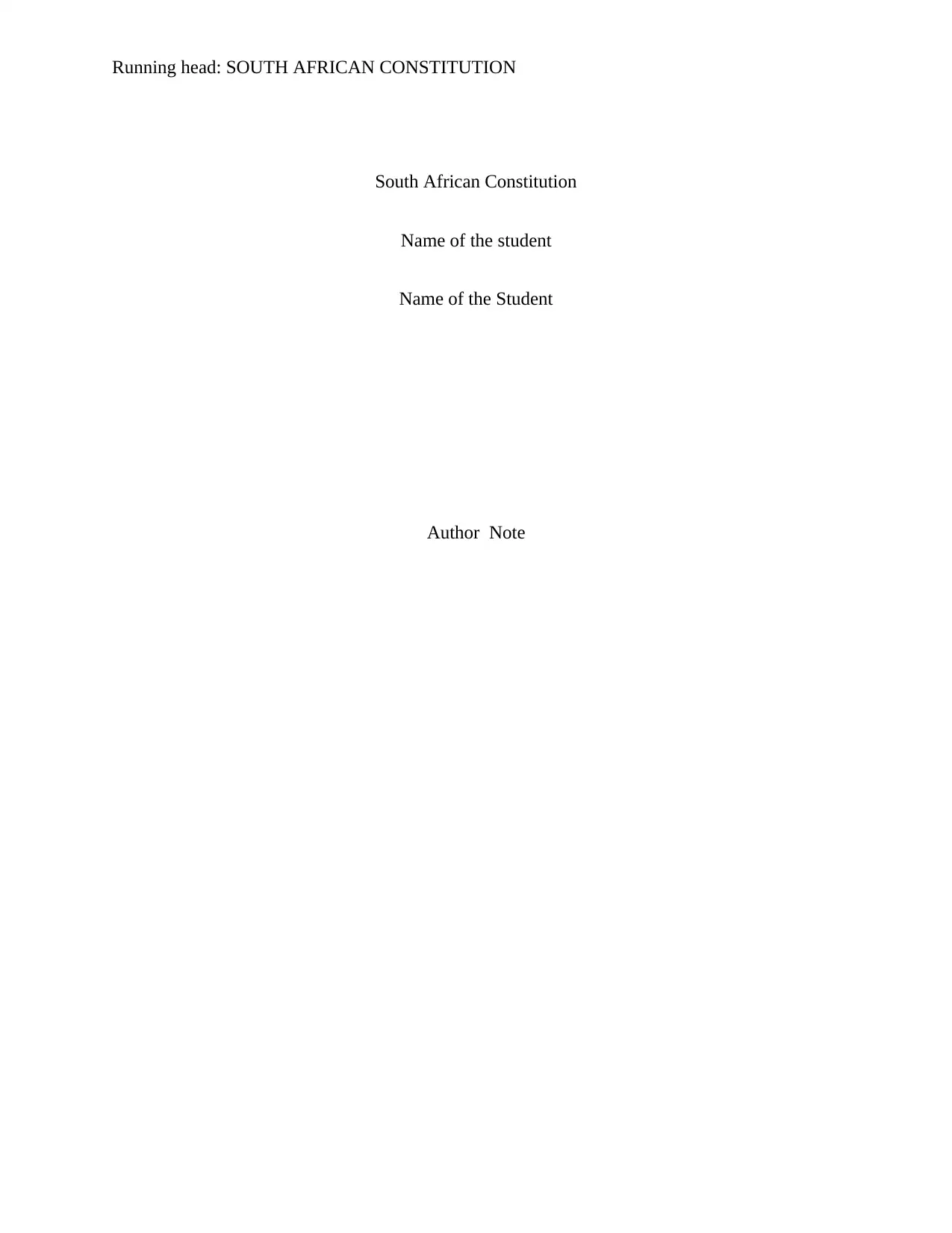
Running head: SOUTH AFRICAN CONSTITUTION
South African Constitution
Name of the student
Name of the Student
Author Note
South African Constitution
Name of the student
Name of the Student
Author Note
Paraphrase This Document
Need a fresh take? Get an instant paraphrase of this document with our AI Paraphraser
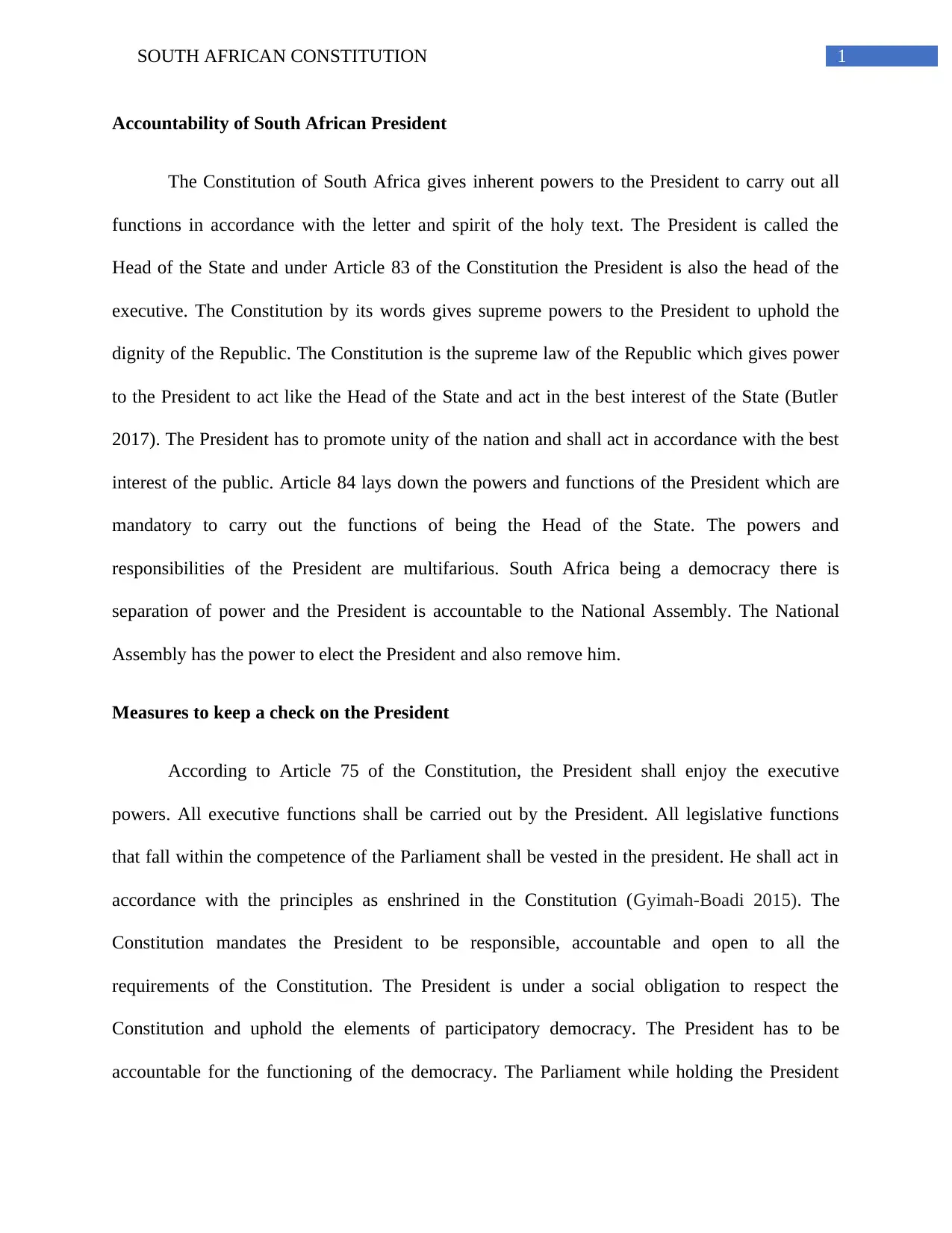
1SOUTH AFRICAN CONSTITUTION
Accountability of South African President
The Constitution of South Africa gives inherent powers to the President to carry out all
functions in accordance with the letter and spirit of the holy text. The President is called the
Head of the State and under Article 83 of the Constitution the President is also the head of the
executive. The Constitution by its words gives supreme powers to the President to uphold the
dignity of the Republic. The Constitution is the supreme law of the Republic which gives power
to the President to act like the Head of the State and act in the best interest of the State (Butler
2017). The President has to promote unity of the nation and shall act in accordance with the best
interest of the public. Article 84 lays down the powers and functions of the President which are
mandatory to carry out the functions of being the Head of the State. The powers and
responsibilities of the President are multifarious. South Africa being a democracy there is
separation of power and the President is accountable to the National Assembly. The National
Assembly has the power to elect the President and also remove him.
Measures to keep a check on the President
According to Article 75 of the Constitution, the President shall enjoy the executive
powers. All executive functions shall be carried out by the President. All legislative functions
that fall within the competence of the Parliament shall be vested in the president. He shall act in
accordance with the principles as enshrined in the Constitution (Gyimah-Boadi 2015). The
Constitution mandates the President to be responsible, accountable and open to all the
requirements of the Constitution. The President is under a social obligation to respect the
Constitution and uphold the elements of participatory democracy. The President has to be
accountable for the functioning of the democracy. The Parliament while holding the President
Accountability of South African President
The Constitution of South Africa gives inherent powers to the President to carry out all
functions in accordance with the letter and spirit of the holy text. The President is called the
Head of the State and under Article 83 of the Constitution the President is also the head of the
executive. The Constitution by its words gives supreme powers to the President to uphold the
dignity of the Republic. The Constitution is the supreme law of the Republic which gives power
to the President to act like the Head of the State and act in the best interest of the State (Butler
2017). The President has to promote unity of the nation and shall act in accordance with the best
interest of the public. Article 84 lays down the powers and functions of the President which are
mandatory to carry out the functions of being the Head of the State. The powers and
responsibilities of the President are multifarious. South Africa being a democracy there is
separation of power and the President is accountable to the National Assembly. The National
Assembly has the power to elect the President and also remove him.
Measures to keep a check on the President
According to Article 75 of the Constitution, the President shall enjoy the executive
powers. All executive functions shall be carried out by the President. All legislative functions
that fall within the competence of the Parliament shall be vested in the president. He shall act in
accordance with the principles as enshrined in the Constitution (Gyimah-Boadi 2015). The
Constitution mandates the President to be responsible, accountable and open to all the
requirements of the Constitution. The President is under a social obligation to respect the
Constitution and uphold the elements of participatory democracy. The President has to be
accountable for the functioning of the democracy. The Parliament while holding the President
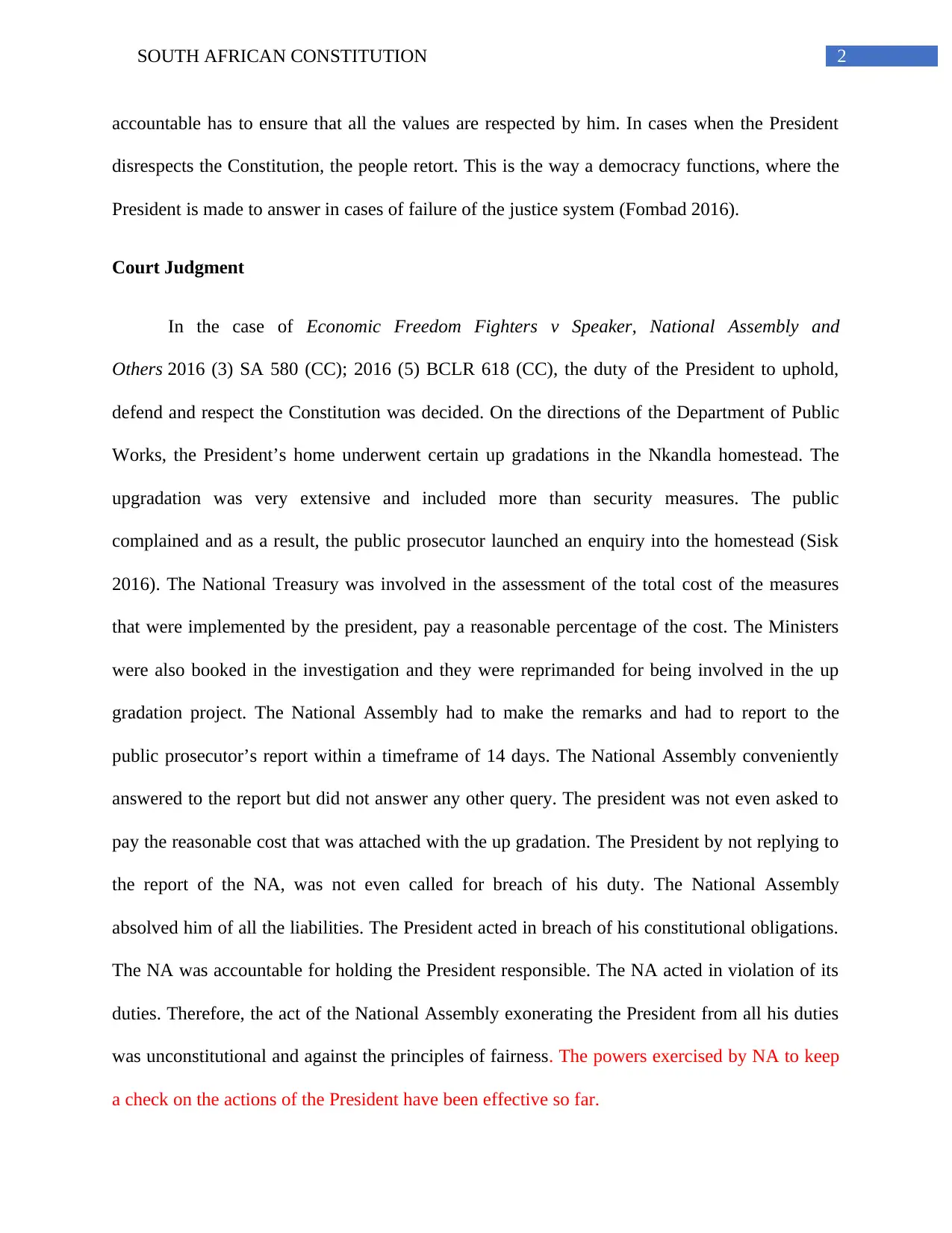
2SOUTH AFRICAN CONSTITUTION
accountable has to ensure that all the values are respected by him. In cases when the President
disrespects the Constitution, the people retort. This is the way a democracy functions, where the
President is made to answer in cases of failure of the justice system (Fombad 2016).
Court Judgment
In the case of Economic Freedom Fighters v Speaker, National Assembly and
Others 2016 (3) SA 580 (CC); 2016 (5) BCLR 618 (CC), the duty of the President to uphold,
defend and respect the Constitution was decided. On the directions of the Department of Public
Works, the President’s home underwent certain up gradations in the Nkandla homestead. The
upgradation was very extensive and included more than security measures. The public
complained and as a result, the public prosecutor launched an enquiry into the homestead (Sisk
2016). The National Treasury was involved in the assessment of the total cost of the measures
that were implemented by the president, pay a reasonable percentage of the cost. The Ministers
were also booked in the investigation and they were reprimanded for being involved in the up
gradation project. The National Assembly had to make the remarks and had to report to the
public prosecutor’s report within a timeframe of 14 days. The National Assembly conveniently
answered to the report but did not answer any other query. The president was not even asked to
pay the reasonable cost that was attached with the up gradation. The President by not replying to
the report of the NA, was not even called for breach of his duty. The National Assembly
absolved him of all the liabilities. The President acted in breach of his constitutional obligations.
The NA was accountable for holding the President responsible. The NA acted in violation of its
duties. Therefore, the act of the National Assembly exonerating the President from all his duties
was unconstitutional and against the principles of fairness. The powers exercised by NA to keep
a check on the actions of the President have been effective so far.
accountable has to ensure that all the values are respected by him. In cases when the President
disrespects the Constitution, the people retort. This is the way a democracy functions, where the
President is made to answer in cases of failure of the justice system (Fombad 2016).
Court Judgment
In the case of Economic Freedom Fighters v Speaker, National Assembly and
Others 2016 (3) SA 580 (CC); 2016 (5) BCLR 618 (CC), the duty of the President to uphold,
defend and respect the Constitution was decided. On the directions of the Department of Public
Works, the President’s home underwent certain up gradations in the Nkandla homestead. The
upgradation was very extensive and included more than security measures. The public
complained and as a result, the public prosecutor launched an enquiry into the homestead (Sisk
2016). The National Treasury was involved in the assessment of the total cost of the measures
that were implemented by the president, pay a reasonable percentage of the cost. The Ministers
were also booked in the investigation and they were reprimanded for being involved in the up
gradation project. The National Assembly had to make the remarks and had to report to the
public prosecutor’s report within a timeframe of 14 days. The National Assembly conveniently
answered to the report but did not answer any other query. The president was not even asked to
pay the reasonable cost that was attached with the up gradation. The President by not replying to
the report of the NA, was not even called for breach of his duty. The National Assembly
absolved him of all the liabilities. The President acted in breach of his constitutional obligations.
The NA was accountable for holding the President responsible. The NA acted in violation of its
duties. Therefore, the act of the National Assembly exonerating the President from all his duties
was unconstitutional and against the principles of fairness. The powers exercised by NA to keep
a check on the actions of the President have been effective so far.
⊘ This is a preview!⊘
Do you want full access?
Subscribe today to unlock all pages.

Trusted by 1+ million students worldwide
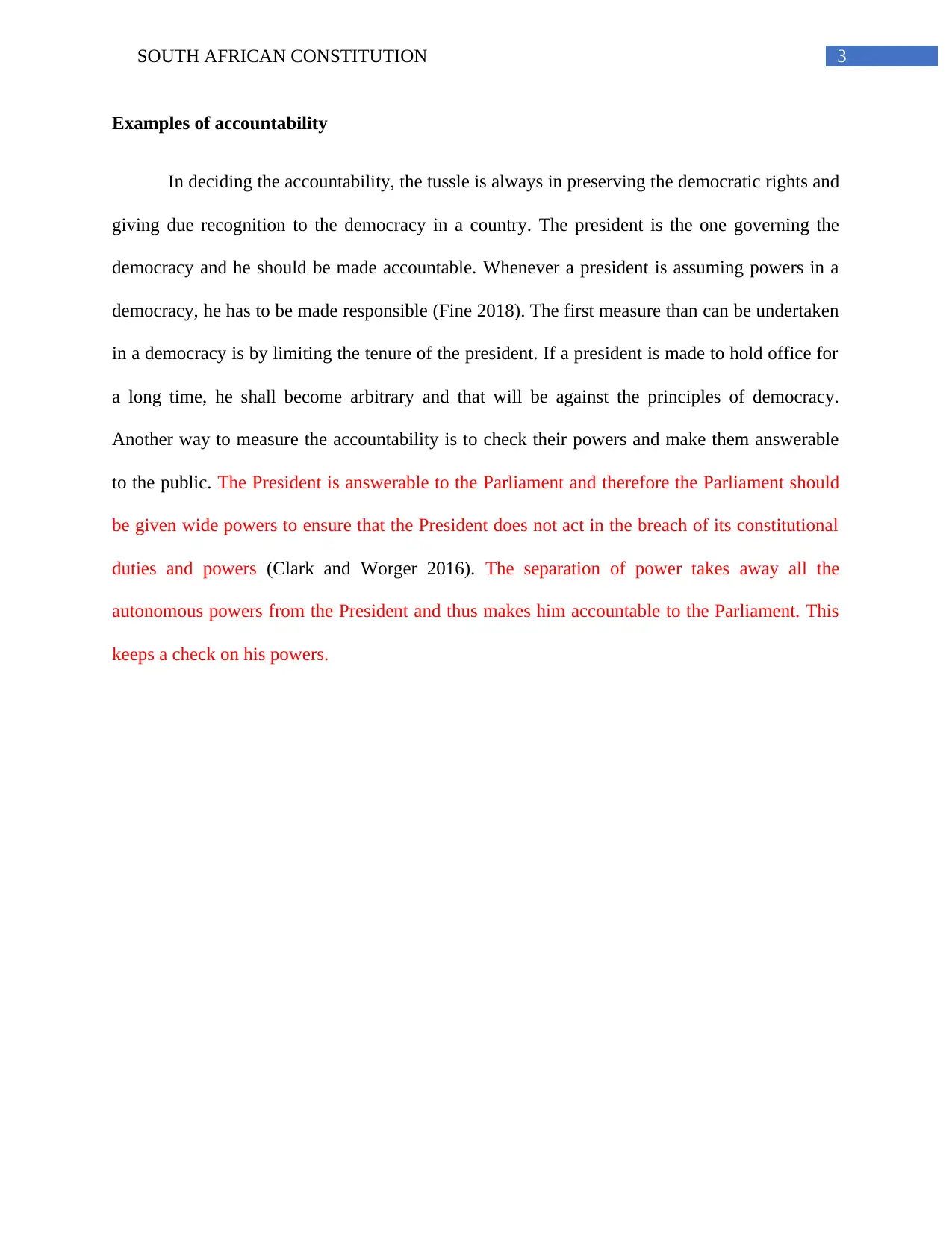
3SOUTH AFRICAN CONSTITUTION
Examples of accountability
In deciding the accountability, the tussle is always in preserving the democratic rights and
giving due recognition to the democracy in a country. The president is the one governing the
democracy and he should be made accountable. Whenever a president is assuming powers in a
democracy, he has to be made responsible (Fine 2018). The first measure than can be undertaken
in a democracy is by limiting the tenure of the president. If a president is made to hold office for
a long time, he shall become arbitrary and that will be against the principles of democracy.
Another way to measure the accountability is to check their powers and make them answerable
to the public. The President is answerable to the Parliament and therefore the Parliament should
be given wide powers to ensure that the President does not act in the breach of its constitutional
duties and powers (Clark and Worger 2016). The separation of power takes away all the
autonomous powers from the President and thus makes him accountable to the Parliament. This
keeps a check on his powers.
Examples of accountability
In deciding the accountability, the tussle is always in preserving the democratic rights and
giving due recognition to the democracy in a country. The president is the one governing the
democracy and he should be made accountable. Whenever a president is assuming powers in a
democracy, he has to be made responsible (Fine 2018). The first measure than can be undertaken
in a democracy is by limiting the tenure of the president. If a president is made to hold office for
a long time, he shall become arbitrary and that will be against the principles of democracy.
Another way to measure the accountability is to check their powers and make them answerable
to the public. The President is answerable to the Parliament and therefore the Parliament should
be given wide powers to ensure that the President does not act in the breach of its constitutional
duties and powers (Clark and Worger 2016). The separation of power takes away all the
autonomous powers from the President and thus makes him accountable to the Parliament. This
keeps a check on his powers.
Paraphrase This Document
Need a fresh take? Get an instant paraphrase of this document with our AI Paraphraser
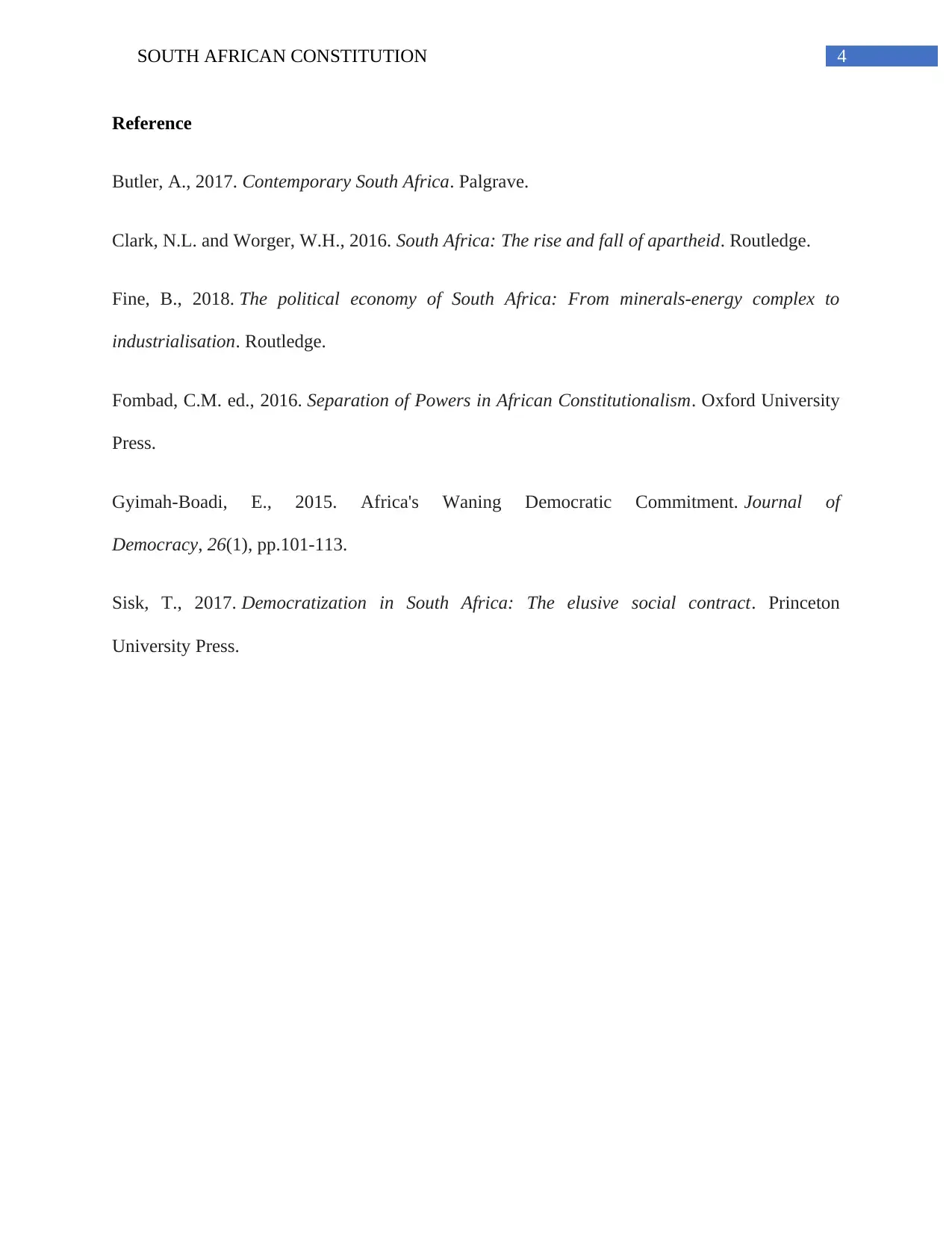
4SOUTH AFRICAN CONSTITUTION
Reference
Butler, A., 2017. Contemporary South Africa. Palgrave.
Clark, N.L. and Worger, W.H., 2016. South Africa: The rise and fall of apartheid. Routledge.
Fine, B., 2018. The political economy of South Africa: From minerals-energy complex to
industrialisation. Routledge.
Fombad, C.M. ed., 2016. Separation of Powers in African Constitutionalism. Oxford University
Press.
Gyimah-Boadi, E., 2015. Africa's Waning Democratic Commitment. Journal of
Democracy, 26(1), pp.101-113.
Sisk, T., 2017. Democratization in South Africa: The elusive social contract. Princeton
University Press.
Reference
Butler, A., 2017. Contemporary South Africa. Palgrave.
Clark, N.L. and Worger, W.H., 2016. South Africa: The rise and fall of apartheid. Routledge.
Fine, B., 2018. The political economy of South Africa: From minerals-energy complex to
industrialisation. Routledge.
Fombad, C.M. ed., 2016. Separation of Powers in African Constitutionalism. Oxford University
Press.
Gyimah-Boadi, E., 2015. Africa's Waning Democratic Commitment. Journal of
Democracy, 26(1), pp.101-113.
Sisk, T., 2017. Democratization in South Africa: The elusive social contract. Princeton
University Press.
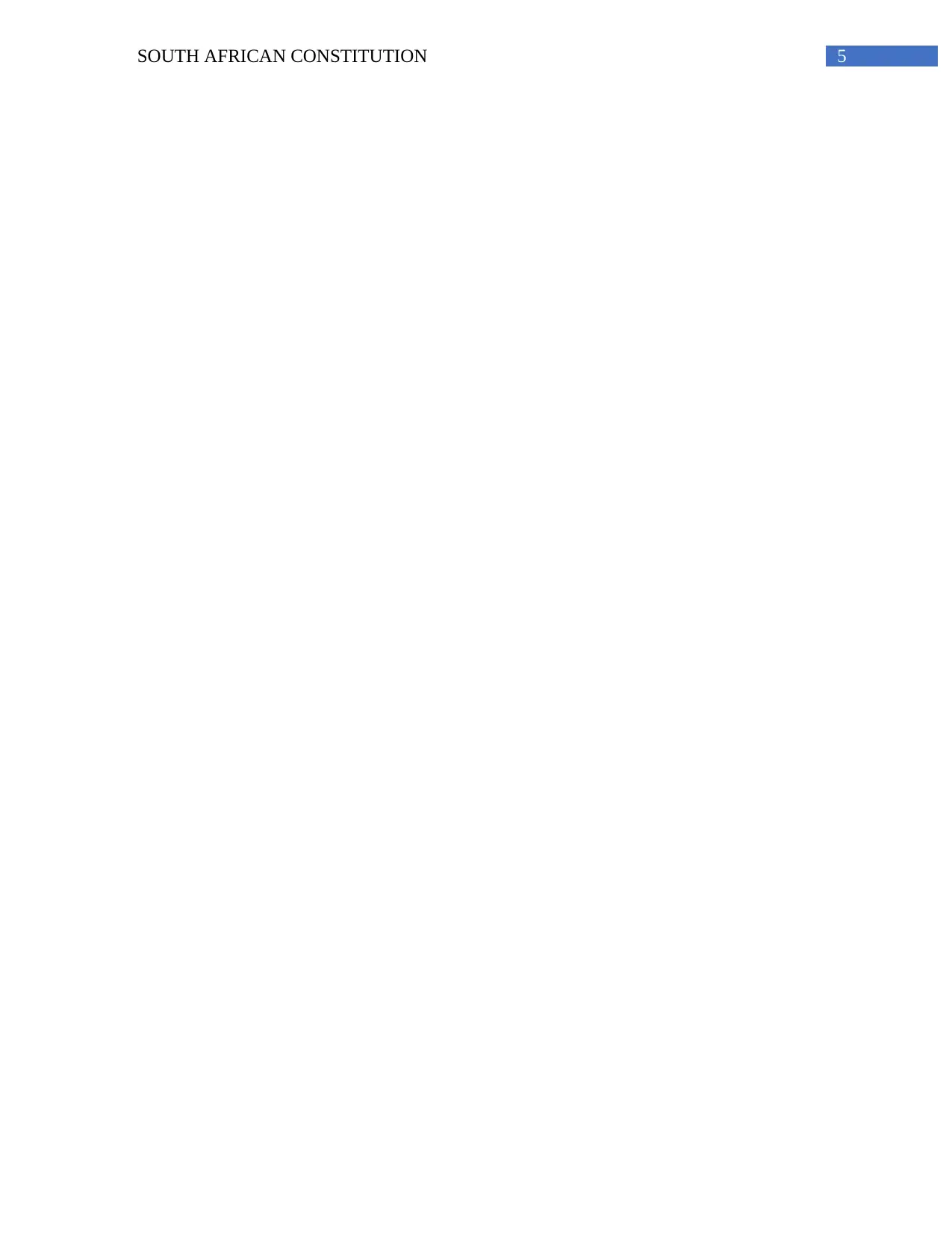
5SOUTH AFRICAN CONSTITUTION
⊘ This is a preview!⊘
Do you want full access?
Subscribe today to unlock all pages.

Trusted by 1+ million students worldwide
1 out of 6
Related Documents
Your All-in-One AI-Powered Toolkit for Academic Success.
+13062052269
info@desklib.com
Available 24*7 on WhatsApp / Email
![[object Object]](/_next/static/media/star-bottom.7253800d.svg)
Unlock your academic potential
Copyright © 2020–2025 A2Z Services. All Rights Reserved. Developed and managed by ZUCOL.




